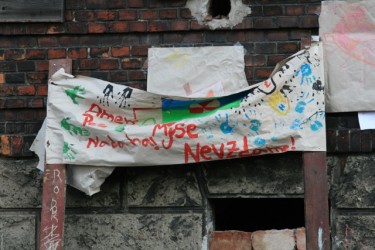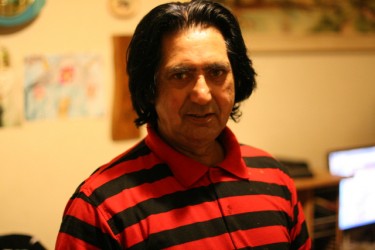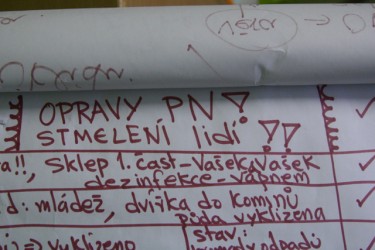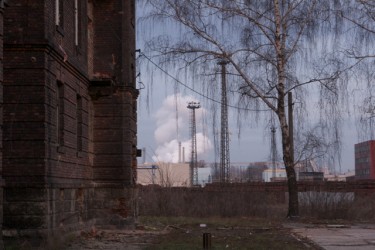In August 2012, the Ostrava City Hall issued a 24-hour eviction order to the owner of the 11 buildings at Přednádraží, asking him to evict all of the residents, giving as a reason an unsafe condition of the buildings, primarily due to broken sewage lines. Three lawsuits have been filed between the various departments of the Ostrava City Hall to establish responsibility for fixing the sewage lines, but in the meantime, the residents have to bear the consequences of this neglect (earlier GV coverage of the case – here [1] and here [2]).

“We Won't Give Up!” (August 2012). Photo by Daniela Kantorova.
Approximately 100 families, supported by local activists, refused to move out. Many simply did not have anywhere else to go; some have been living there for over 30 years. Now, five months later, twelve families still remain at Přednádraží, including six children. Everyone, except for one couple, moved to Building #8, which has become the focus of community efforts.

Building 8 at Přednádraží. Photo by Daniel Arauz, used with permission.
The Building Works Authority outlined a list of repairs necessary to make in order for it to consider the Přednádraží buildings inhabitable, and the owner, Mr. Roztočil, agreed that the residents could make the required repairs to Building #8 themselves. Since the owner has no funds available, the community relies on the funds raised by local activists. So far, the roof has been fixed, the basements have been cleared, and the chimneys will be next.

Jan Bandy, Community Organizer at Přednádraží. Photo by Daniela Kantorova.

Přednádraží Repairs Plan. Photo by Daniela Kantorova.
All this is happening in harsh conditions: water supply still comes from a single tap, and electricity is officially supplied to only one apartment. One couple also still remains in Building #17, where it has a supply of electricity, but no running water. They are ethnic Czechs, who have not been able to move elsewhere. Both with chronic health problems, they are scrambling to pay for their medications each month. However, the community is determined to continue with repairs.

Building #17 at Přednádraží. Photo by Daniela Kantorova.
Although the number of families at Přednádraží has diminished and most buildings have fallen prey to gangs of looters looking for scrap metal and construction materials, largely ignored by the police, some residents who had previously moved out expressed an interest in coming back. Many families that left Přednádraží did not have any other option but move to overpriced hostels. They have been facing dire conditions in the hostels: overcrowding, an epidemic of dysentery [3] [en] that broke out in the fall, and even pressure to stop speaking out under the threat of eviction from the hostels themselves.

Přednádraží after looting. Photo by Daniel Arauz, used with permission.
There are allegations of a connection between city officials and hostel owners who receive public funding to run the hostels. However, hostels are anything but a cheap housing alternative. For instance, a hostel at Cihelní Street in Ostrava [4] [cs] charges 80 CZK per person per night for long-term stay if four or more people are staying in a single room with shared facilities. For a six-member family this would translate into 14,400 CZK a month (740 USD), which is unaffordable for most, as the Czech average monthly salary [5] (cs) is approximately 24,500 CZK (1,265 USD).
It has been extremely difficult for the people of Přednádraží to find alternative housing due to the lack of low cost housing in Ostrava, and exorbitantly high rental deposits charged to the Roma by private landlords. Moreover, many residents of Přednádraží are unemployed.

Building #17 at Přednádraží. Photo by Daniela Kantorova.
The Roma get frequently blamed for their unemployment, but the reasons for this, other than the outright discrimination on the side of employers, are rooted in the historical oppression of the Roma in Europe. For instance, the Czech Republic has a decades-long history of segregation in education [6] [en] that was practiced during the years of the communist dictatorship and continues still. There was a common practice of sending all Roma children to separate Special Education schools for children with cognitive impairments, without any psychological assessment that would demonstrate such impairments.
In 2007, the European Court of Human Rights in Strasbourg ruled in the case brought against the Czech Republic by Roma citizens [7] [en] to condemn this practice. In November 2012, the Roma of Ostrava organized a march [8] [en] on the anniversary of this decision. This march was the first reported action organized independently by the Roma activists without any government or NGO support.
Despite the decision of the European Court, however, and despite the fact that the city of Ostrava, for instance, started its EU-sponsored program of “social inclusion” [9] [cs] in February 2012, the discrimination of the Roma children in schools continues, according to a report published by the Czech branch of Amnesty International [10] [en] in November 2012.
The Czech government has also been lagging in its follow-through on the situation at Přednádraží. Although a report was produced by the office of the ombudsman, whose advisors visited Přednádraží in the summer, this report still remains to be published. The people of Přednádraží have yet to see a sign of goodwill from the authorities, a sign that is many years overdue. Meantime, they continue fighting for their basic human right for a home, despite threats, poverty, and harsh living conditions.